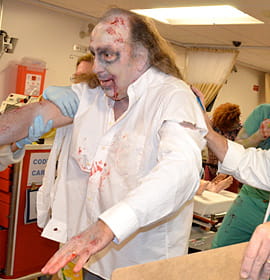Zombie Uprising Helps Nurse Educators' BRAINS
 By Rachel Ewing
By Rachel Ewing

- On the Trail of Deepfakes, Drexel Researchers Identify ‘Fingerprints’ of AI-Generated Video
- New AI-Technology Estimates Brain Age Using Low-Cost EEG Device
- Bolstered by Research Consortium with Drexel, Jefferson’s Sidney Kimmel Cancer Center Earns NCI Comprehensive Cancer Center Designation
- No link between acetaminophen use during pregnancy and children's autism risk

They came from beyond the grave… and gave 24 nursing educators an unforgettable lesson they’ll take with them as they train the next generation of health professionals across the continent.
Monday morning, 24 nursing education professionals from across the U.S. and Canada gathered at Drexel for the first day of a week-long certificate program in clinical simulation at the College of Nursing and Health Professions – where they will learn to manage simulation labs for training health professionals at their home institutions. They expected a classroom workshop in the use of manikins and standardized patients (actors tasked with portraying a patient to aid hands-on and interpersonal training for students). Little did they know, something more sinister was lurking in body bags in the very next room.
An hour into the morning session, program organizer Carol Okupniak and simulation coordinator John Cornele interrupted with news of a breaking emergency: An outbreak of the highly infectious viral agent Ataxic Neurodegenerative Satiety Deficiency Syndrome (as described by the CDC) had taken hold in Philadelphia. All the health professionals at Drexel that day, including the simulation program participants, were being called in to attend to victims of the virus. Okupniak is the director of the Center for Interdisciplinary Clinical Simulation and Practice (CICSP) at Drexel, and a lead organizer of the week’s events.
The first twelve participants rushed in to attend to the “ill and wounded” manikins. (Ten rushed in, while two stopped to don gowns and masks before exposing themselves to an infectious agent.) They checked vital signs and attempted to assess their patients.
A few minutes later, the remaining twelve participants followed. Their assignment: Visit the morgue area and identify the five dead bodies. But these were no ordinary dead people. The instant they were touched, the dead (actors) rose, grunting, stumbling, and uttering a low but urgent groan of “Braaaaaaains.” They lurched toward the manikin patients in their beds, reaching for the sweet nectar resting on their pillows. (That is, brains, made of Jell-o and gummi worms.)
The participants tasked with identifying the dead rallied to contain their “patients” in the morgue area, while those responsible for manikins stood guard over their precious brains. As the room nevertheless grew increasingly chaotic, Okupniak called in reinforcements in the form of additional staff who had already been infected with the virus.
 And so the third wave of zombies – CICSP and Drexel staff members Angie DeRamus, Shenna Hines, Fabien Pampaloni, and Nick Mazzuca – stumbled in. Instead of helping as intended, they fought for their share of the tasty, precious brains.
And so the third wave of zombies – CICSP and Drexel staff members Angie DeRamus, Shenna Hines, Fabien Pampaloni, and Nick Mazzuca – stumbled in. Instead of helping as intended, they fought for their share of the tasty, precious brains.
After ten minutes of growing chaos and confusion, a voice over the intercom called the scenario to an end. As the stunned participants filed out of the simulation room, headed to a debriefing session, Michael Jackson’s “Thriller” began playing over the speakers, and the actors broke out of zombie character and began to dance.
Lessons Learned
In the debriefing session, conference participants discussed their feelings about the simulation exercise. Okupniak and Dr. Leland “Rocky” Rockstraw, who led the debriefing, emphasized that their goal was to give the participants the experience of their students’ perspective on simulation scenarios, by throwing them directly into one. When participants noted that they felt underprepared to handle this emergency – having no idea what they were in for with Ataxic Neurodegenerative Satiety Deficiency Syndrome – that became a learning point, that preparing students prior to clinical simulation is key.
In the debriefing, Okupniak also demonstrated the importance of a Zombie Apocalypse Survival Kit, as described by the CDC – useful for all kinds of emergencies, including some that have affected the region recently, such as floods.
Drexel’s Zombies Will Rise Again
While all clinical simulation scenarios in Drexel’s CICSP are recorded on digital video for educational review, this week’s events were recorded with several additional cameras. The CICSP staff plan to produce a video for the Zombie Apocalypse Emergency Preparedness video contest to be announced later this month by the CDC.
More Photos and Behind the Scenes
For additional photos and behind-the-scenes views of preparing the zombie uprising at Drexel, view the Flickr photoset.
Additional coverage of the event on Newsworks.org: Zombies attack in Center City -- but it's for a good cause.
In This Article
Contact
Drexel News is produced by
University Marketing and Communications.